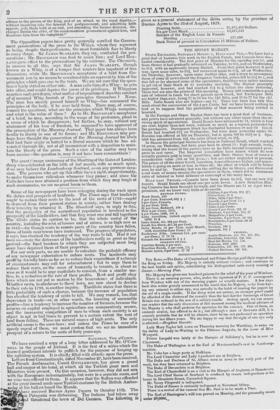The Opposition papers have pretty generally ascribed the Govern- ment
prosecutions of the press to the Whigs, whom they represent as being, despite theirprofessions, the most formidable foes to liberty in every shape. Sir JAMES SCARLETT, they say, conducted the pro- secutions ; Mr. BROUGHAM was feed to assist him ; and Lord Ilor.- LAND gave effect to the prosecutions by his evidence. The Chronicle, in answer to all this, says that Sir JAMES SCARLETT, though known as a Whig is of a temper that renders him impatient of free discussion; while Mr. BROUGHAM'S acceptance of a brief from Go- vernment can by no means be construed into an approval by him of the - principles which gave rise to the trials. We are not sure that the ques- tion is fairly stated on eitherside. A man calls himself a Whig : he gets into office, and would deprive the press of its privileges. If Whiggism sanction such privileges, what matter of impeachment does this conduct of al nominal Whig furnish of the principles themselves ? None. The man has merely proved himself no Whig—has renounced the principles of the body, it he ever held them. There may, of course, remain the questions, what are the principles which Whigs recognize, and What is the value of these ? As to Mr. BROUGHAM'S acceptance of a brief, he may, according to the usage of his profession, plead in a cause of which he disapproves ; but further, he may, without any abatement of his love of freedom, be supposed/to have approved of the prosecution of the Morning Journal. That paper has always been hostile to liberty in one of its forms' and Mr. BROUGHAM may per- haps have thought the prosecution of the Morning Journal for libels that had their origin. in hatred to a liberal measure which he has ad- vocated through life, not at all inconsistent with a disposition to main- tain the liberty of the press. Such a view of the matter may have been unwise—the question is, may it not have been conscientious ?


















 Previous page
Previous page